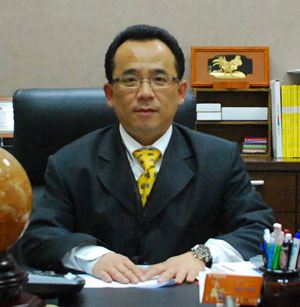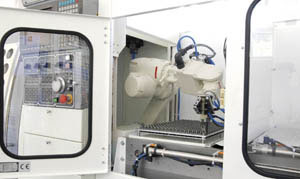Quick-Tech Teams Up With Germany's Muga
2009/05/04 | By Ben Shen | QUICK-TECH MACHINERY CO., LTD.Taiwan-based lathe maker Quick-Tech Machinery Co., Ltd. and Muga of Germany reached a co-branding agreement in June 2008, opening a door for Quick-Tech to expand sales of its computerized numerically controlled (CNC) lathes in the European market.
Following the inking of a strategic-alliance agreement between Quick-Tech and Japan's Mitsubishi Electric Corp. in February 2008, Muga acquired a 35% stake in Quick-Tech for US$1 million. Muga will buy NT$100 million (US$3.03 million) worth of Quick-Tech products for distribution in Europe.

Quick-Tech has begun supplying products under the Quick-Tech and Muga-Tech brands. Quick-Tech will develop the Muga-Tech products for export to Germany, while Quick-Tech branded products will be shipped to other global markets. The Muga-Tech products involve manufacturing technologies transferred from Muga, while the Quick-Tech models are developed by the company itself.
Since 2004, Muga has been the exclusive sales agent in Germany for Quick-Tech. Muga, a professional manufacturer of tapping centers, says the CNC lathes produced by Quick-Tech has enhanced its product line and helped boost sales over the past few years. After reaching an agreement with Quick-Tech on product quality, Muga resolved to invest in Quick-Tech based on the recognition that mutual cooperation will help both sides grow faster and sounder.
"As a professional manufacturer of machine tools, I am always thinking about launching international cooperation ventures with well-established foreign manufacturers in the same field to enhance our product quality," explains K.C. Jacky Huang, managing director of Quick-Tech. "Domestic manufacturers of machine tools have to acquire advanced technologies to enhance product quality and fend off price competition from developing nations," he says.
Quick-Tech turned to Muga for the German company's advanced know-how in manufacturing or management. Huang says that Muga has expertise in manufacturing high-quality machine tools and extensive experience in making tapping centers that can maintain steady quality under any climate conditions.
Modular Design
Quick-Tech has employed modular design technology for a decade to streamline manufacturing processes. "The modular design approach has enabled us to boost the average annual output value of each of our 60 employees to NT$10 million, which is considerably higher than the industry average in Taiwan," says Huang.
Quick-Tech has focused on various machine types to guide its two-year development programs. Multiple machining and simultaneous multiple machining units were the company's emphasis in 2003 and 2005, respectively. In 2008, the company turned its attention to intelligent cutting, embodied in a multiple-machining unit with robotic arms.

The multiple-machining machine with built-in robotic arm was announced at the end of 2008. Quick-Tech says the compact machine reduces production space and equipment installation costs. "The intelligent machining concept has been in existence for a few years, especially in Europe, the U.S. and Japan," says Huang. "But there is a lot of room for the improvement. I believe that the intelligent machining concept should be executed in the manufacturing process. That's why we have adopted a modular design approach, which allows us to develop a new product line without changing the whole production line."
Debut Innovative Machines
Quick-Tech will display two "IT Robot"-series multiple-machining CNC lathes with built-in robotic arms, a "TT"-series dual-spindle, dual-turret multiple-machining CNC lathe, and other CNC lathes with advanced models at the 2009 Taipei International Machine Tool Show (TIMTOS 2009), slated for March 2-7, 2009, at the Taipei World Trade Center and the TWTC Nangang Exhibition Hall.
Huang says that innovative technology goes into every Quick-Tech product. "Many of our customers say our products out-class others in terms of innovation," Huang says.
"By investing in innovation we don't have to compete entirely on price," says Huang. "That's why the global financial crisis hasn't affected our business." Huang says his company has a three-month backlog of orders at a time that many other machine-tool manufacturers in Taiwan are trying to fill capacity.
Another advantage of Quick-Tech rests with the company's use of advanced materials like titanium and platinum to make its machines lightweight, durable and highly precise.
Strategic Alliance With Mitsubishi
Under its alliance with Mitsubishi Electric, Quick-Tech says it has substantially upgraded manufacturing techniques as well as after-sale services. The venture is the first that the company has entered into with a key-component supplier. In the past, Quick-Tech concentrated on the production of open-architecture personal computer (PC)-based CNC lathes. Now the company is poised to develop more powerful multifunctional products.
"PC-based CNC machines can handle multi-spindle and complex machining jobs," notes Huang. "But PC-based CNC models are not well-suited to the sophisticated machining jobs required by our German customers," Huang says. "The partnership with Mitsubishi, a major supplier of servo components in Taiwan's machine-tool market, helps us to address this issue."
According to the deal, Quick-Tech will procure NT$100 million (US$3.03 million at US$1:NT$33) worth of CNC controllers and related key components from Mitsubishi Electric over the coming year. The Japanese partner in turn will supply high-tier products such as the M700-series CNC controllers coupled with integration of manufacturing techniques to help the Taiwanese partner upgrade its product level.
Powerful CNC-control Systems
Huang says that his company is transitioning to concentrate on multi-stack CNC lathes, which require more powerful CNC-control systems to handle sophisticated machining functions. In 2007, Quick-Tech began using Mitsubishi's M70-series CNC controllers on its multi-stack CNC lathes.
Mitsubishi's servo component and CNC devices are aimed mainly at the machining center and tapping center market, rather than at the CNC lathe market. The deal with Quick-Tech therefore poises the Japanese company to expand its presence in Taiwan, which is a major supplier of CNC lathes. Mitsubishi will offer customized products and services to Quick-Tech in the years to come.
Mitsubishi has promised to supply M70 CNC components for Quick-Tech's multi-spindle CNC lathes in 2008, and it will provide the higher-tier M700-series products in 2009.
Quick-Tech says its sales grew by 28% a year to reach NT$470 million (US$14.68 million) in 2007. The gain owes partly to the adoption of the M70 CNC devices on its CNC lathes, which has helped the company land a raft of new export orders. Quick-Tech estimates that its sales could reach NT$600 million (US$18.75 million) in 2008.
Product Differentiation
Huang says his company will focus on differentiating its product line from those of rival producers. The company has been developing new mechanisms that boost the functions of its CNC machines. It has also registered two patents for such devices, including an automatic tool change device and a power system for cutting tools.
Huang says that Quick-Tech's products have high exposure in such markets as South Africa, Egypt, Norway, United Kingdom, Germany, Peru, Brazil, Argentina and Mexico.
Huang says that the high cost of developing new product lines has led his company to focus its energy on developing increasingly sophisticated machines within its area of specialty: CNC lathes.
Quick-Tech provides round-the-clock online technical service to customers around the world, Huang says.
Elevating Local Content Rate
In the early stage of its establishment, Quick-Tech concentrated on assembly of components sourced from outside suppliers. Over the years, it has expanded its capabilities to handle 60% of the production in-house, helping the company steadily improve profit margins. Despite rising raw material costs, Quick-Tech increased its profit margin by 10% year-on-year in 2008.
Quick-Tech's margins have also benefited from efforts to improve production efficiency. "We enjoy a very low employee turnover rate, which means our people bring a tremendous amount of specialized expertise to the job," says Huang.

